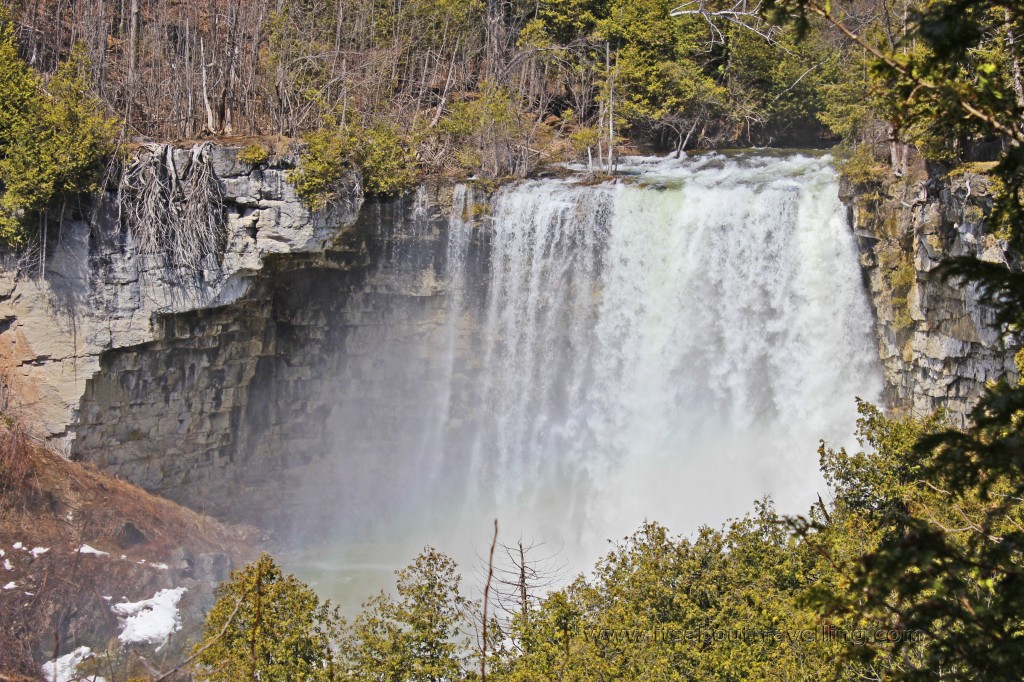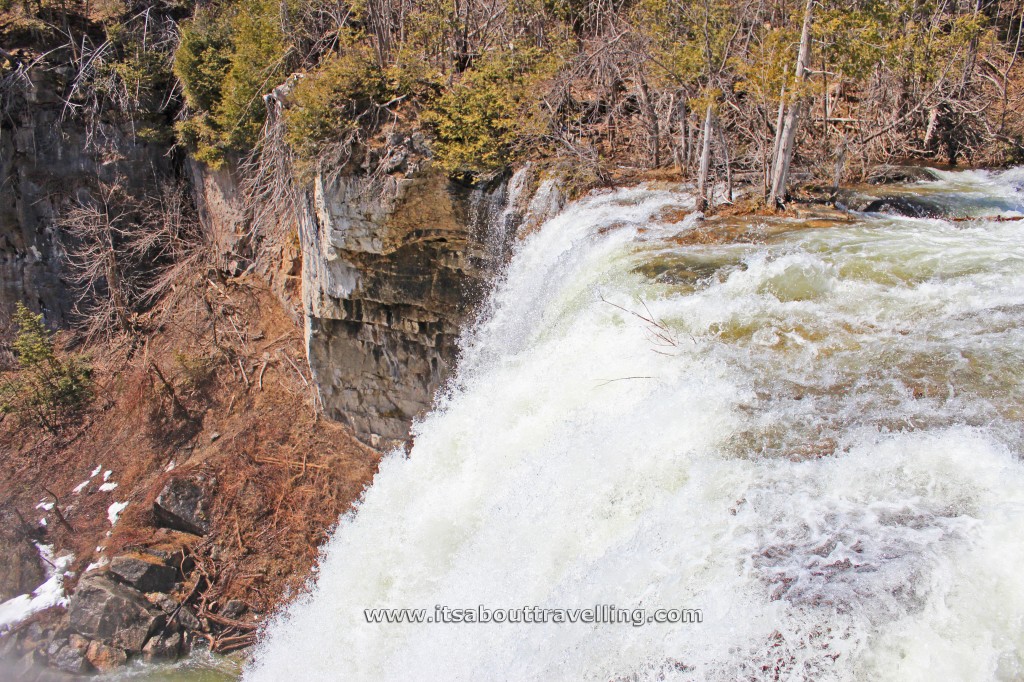Besides the actual Niagara Falls, the best bang for your buck to enjoy the Niagara Escarpment is the Flesherton / Eugenia area. You’ve got the 90 foot Eugenia Falls and the 25 foot Hoggs Falls within a 6 km hike on the Bruce Trail or a five minute drive by car. The only thing is, water volume changes drastically with the season so you have to pick your time to visit accordingly.
Eugenia Falls
Eugenia Falls is best enjoyed from the base. However, even when the waters of the Beaver River are at their summertime lowest, this can be a challenge to attain. Because the river is shrouded in steep cliffs on either side for a distance past downstream from the waterfall, you need to hike nearly a kilometre along the cliffs until there is a steep but manageable trail that leads to the river level.
Once down at river level, the easiest way to get back to the base of the waterfall is by scrambling the rocks all the way back. To follow through the forested area is steep and continually obstructed with fallen trees.
On April 20, 2014, my 15 year old son and I went up to Eugenia in hopes of hiking to the base of the waterfall. We were delighted to find that what is barely a trickle of water during the summer months was a raging mass of water. If you didn’t know there was a hydro electric dam just upstream that creates Lake Eugenia, this could be seen as a wild river more likely found on the Canadian Shield or in the Rocky Mountains.
Getting to the base, I suppose, was still possible. However, the rocks along the river bed that we scrambled up before were now covered by a raging torrent. We would have had to trudge through snow and ice, climbing over fallen tree after fallen tree to get to the base that was almost not visible from the spray from the plunging water.
Take a look at our last visit when were able to reach the base: Eugenia Falls in Summer
So, we enjoyed views from the standard tourist area near the parking lot at Eugenia Falls Conservation Area and from the slightly harder to get to north side. My 400 foot rule was very evident as people parked and walked less than 400 feet to crowd the observation area at the crest of the waterfall but none, other than us, hiked around to the north side for the better view.
The 400 foot rule is not a bad thing. It’s what makes areas exclusive, despite being near sometimes world famous attractions. Devil’s Hole Rapids on the Niagara River is one of these places. Not far from Niagara Falls, where millions visit, Devil’s Hole Rapids can be seen up close and personal after a relatively short hike along the Niagara River.
The above image is taken from the north side of the river looking across Eugenia Falls at the retaining wall that keeps people from falling in. On the side we’re on, the only thing stopping you from a plunge to your death is that little knob of land and dead tree seen at the bottom of the image.
As you’ll see in the second video below, the flow gets cut so much in the summer months that you can stand at the base below the trickle of water and almost wrap your arms around the waterfall. It can be so small that it blows in the wind (you can see this in the second video below).
This tree is obviously not normally in the middle of the river. That’s how swollen the Beaver River was. Typically, in July and August, you can walk directly across the river here, not even having to jump across the water – just step across.
This old stone building was once a power generating plant. The operation has since moved upstream and the dam is what regulates the flow of the Beaver River while keeping Lake Eugenia at the right level for cottagers. The building is really in rough shape this spring as it looks like the heavy snow and ice from the winter of 2013-14 has snapped the timbers that hold the roof up.
Hoggs Falls
Just a short distance away is Hoggs Falls on the Boyne River. The flow over this waterfall was a bit heavier than normal but not as drastic as Eugenia Falls.
The trail along the top was still covered in snow and ice but we were able to get down to the base.
The two videos below are of Eugenia Falls. One was taken at the same time as the images above. The other is from a few years ago when we hiked to the base of the waterfall. The two videos show the drastic difference in Eugenia Falls between the spring melt and late summer.


